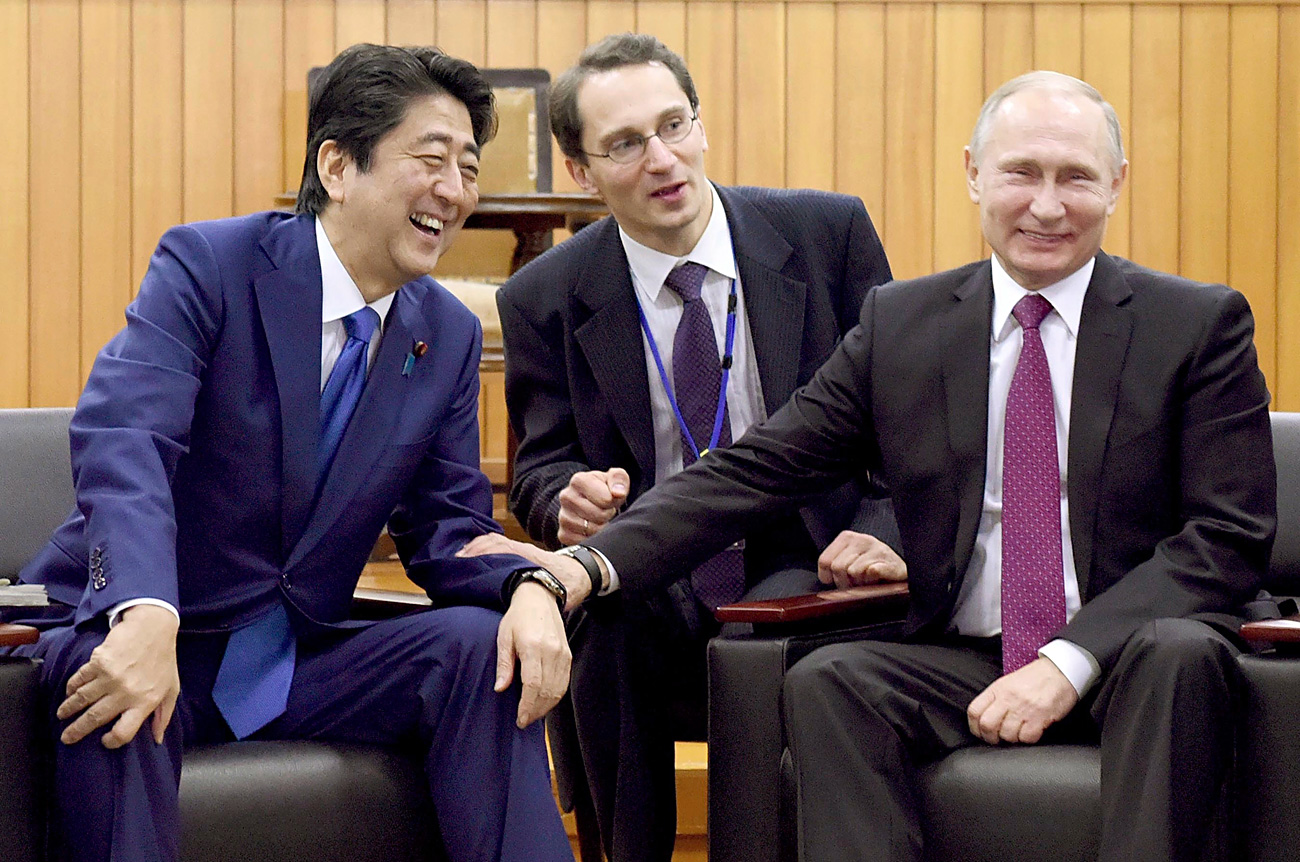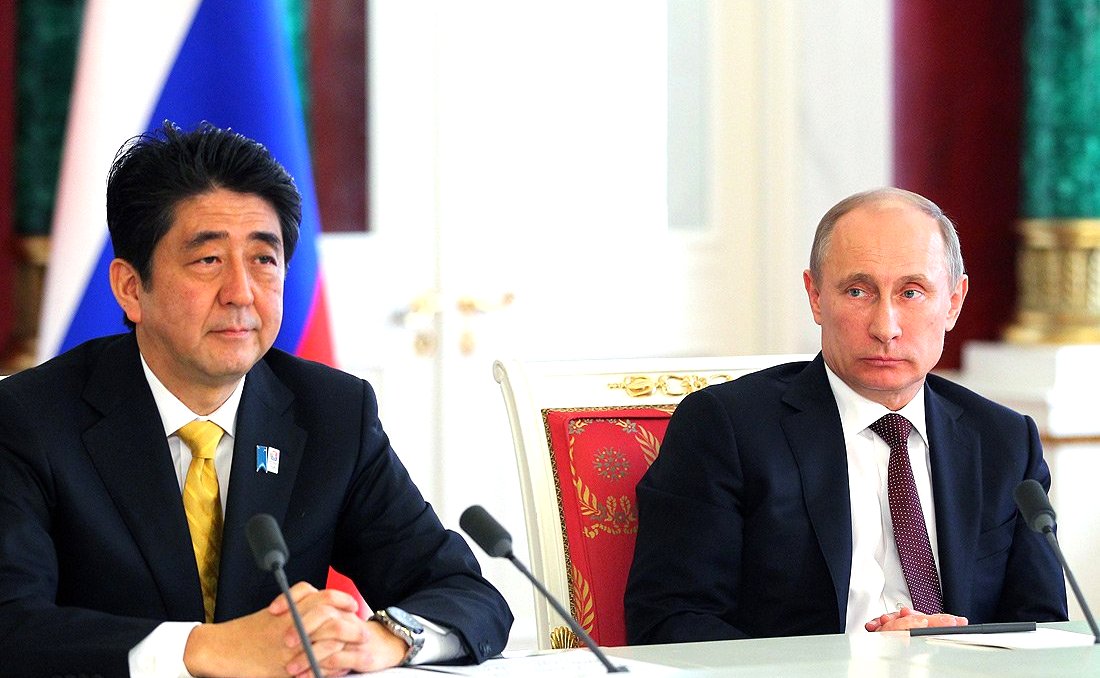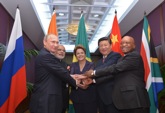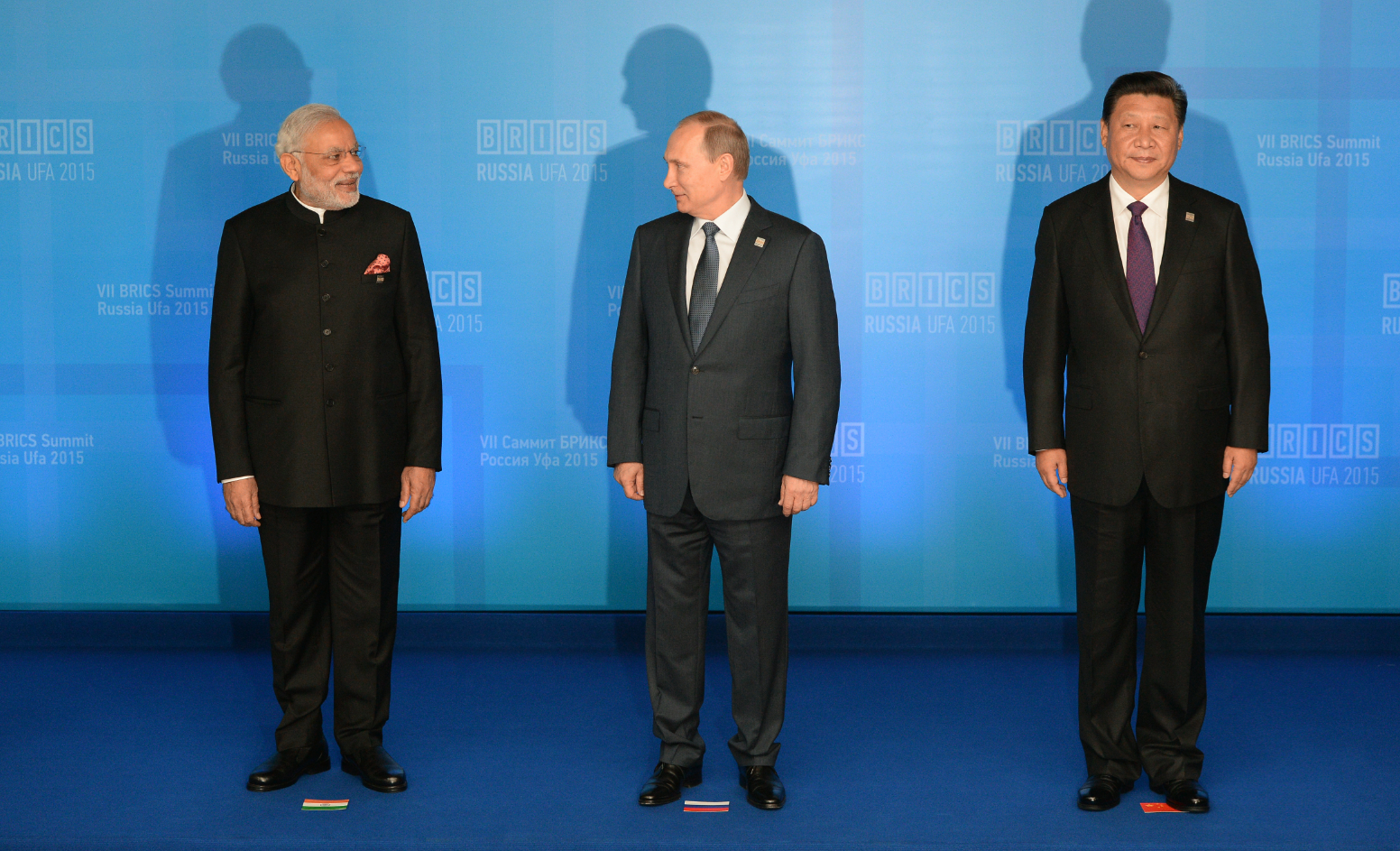Negative reactions in Japan to Putin, Abe talks

Russian President Vladimir Putin, right, chats with Japanese Prime Minister Shinzo Abe, left, during their visit to the Kodokan Judo Institute, in Tokyo, Dec. 16, 2016.
APMost Japanese have taken a negative view of the outcome of the recent talks held between Vladimir Putin and Shinzo Abe, during the former’s visit to Tokyo. However, the Japanese Prime Minister himself had a positive view of the talks during the Russian President’s visit, saying, “It has enabled bilateral relations to soar to a new height”.
There really are no contradictions here – it is simply that Abe has been consistently, but ever so carefully, moving towards solving the ‘territorial issue’.
A recent opinion poll indicates that most Japanese are dissatisfied with the outcome of the high-level talks between Russia and Japan, held on December 15 and 16 between Putin and Abe. 54 percent rated the discussions negatively, while a positive assessment was given by about 39 percent of the respondents, reported Kyodo News. What does this outcome mean?
Only that Japanese public opinion had high expectations from Putin’s visit – it was called historic, much effort was made preparing for it, and it had been postponed many times. Repeated statements by Prime Minister Abe about the serious determination of both parties to move towards the conclusion of a peace treaty, and the resolution of the territorial dispute – had led many Japanese to expect an announcement stating that an agreement was actually reached and finalized. Opinion polls showed that most Japanese were willing to have Russia turn over two of the islands now, and the rest sometime in the future.
If people are told over 70 years about the unshakeable position of the Japanese government “to get back all four islands”, then you build unjustified expectations in the population. Abe, even if he had wanted to, simply could not tell the Japanese that the chances of getting back all four islands do not exist. So this myth will have to be removed gradually. Already the Japanese Prime Minister is being criticized – that it was his optimistic expectations from this visit, and his sweeping pronouncements, which gave rise to false hopes in the Japanese, which are now turning into discontent with the actions of their government.
Abe continues going on the offensive, giving high marks to this visit. In an interview with TASS, among other things, the Prime Minister said:
“If our characters were not so convergent, then we would not have been able to hold a total of 16 such summits, four of which took place this past year, and it would not have been possible to advance these discussions, aimed at concluding a peace treaty...”
“The conclusion of a peace treaty, which has been dogging the two sides for the past 70 years, will lead to a great leap in relations between the two countries. I consider this visit a very positive one, as these talks were an important and significant step forward, on the path to concluding a peace treaty between Japan and Russia. I believe that President Putin’s visit to Japan has contributed to new, more vibrant bilateral relations,” PM Abe said.
Actually, for a demonstration of this potential, it is important to view progress in the current negotiations – such as agreements on joint economic activities on the Kuril Islands.
Moreover, it is clear that the Kuril Islands are part of a larger package of joint economic projects – but joint activities on the islands serve as an important demonstration.
“I believe that Japanese-Russian relations offer the most promising opportunities, and we can even say that these opportunities are endless. President Vladimir Putin and I came to the conclusion that, with shared mutual intent, possibilities for development of relations between Japan and Russia, in all spheres, are limitless,” the Prime Minister added.
“I consider it a great achievement that this time around, we were able to reach an agreement on joint economic activities on the four islands. These joint economic activities will be carried out in the light of a general understanding that they will in no way prejudice the positions of Japan and Russia on the issue of concluding a peace treaty, and this ‘special regime’ is being established only between Japan and Russia, and as a result – Japan and Russia will be working together,” Abe said.
“I also believe that, because the Russian people on the four islands and the Japanese will really start feeling the various agreements that have been achieved, all will come to an understanding of the value in having good Japanese-Russian cooperation, and this will lead to resolving the issue of the peace treaty... That is why I believe that joint economic activity on the four islands, within the ‘special regime’, is an important step towards solving the peace treaty issue.”
What this ‘special regime’ entails, no one knows yet – because it has not been worked out yet. The problem is that if Japanese companies start building enterprises on the islands in accordance with Russian legislation, this will be interpreted as an indirect recognition of Russian sovereignty over them. If Russia enacts some very special conditions for Japanese businesses, then in Russia, people will start saying “we are on the path to losing them”.
Meanwhile, if we talk about the feelings of the Japanese people, most of them think that it is Japan that is ready to make concessions – most likely, and this is what has led to disappointment with the outcome of these talks. This is the same position, that is being voiced by Western media; that Putin has outmanoeuvred Abe.
The Wall Street Journal wrote: “Russian President Vladimir Putin, during talks on the territorial dispute with Japan, refused to make any concessions, demonstrating the uncompromising nature of this leader, a person the US President-elect Donald Trump plans to cooperate with...”
“Putin quite cleverly outmanoeuvred Abe. He is a more experienced and skilful negotiator, and a master of diplomatic manoeuvres,” said James Brown, an analyst of Russia-Japan relations at Temple University in Tokyo.
There has been no outmanoeuvering by anyone. Putin and Abe simply have a common goal, which they want to achieve, of improving relations between the two countries. In the same interview with TASS, the Japanese Prime Minister very emotionally talked about his father, Shintaro Abe, wanting to sign a peace treaty with the Soviet Union. His father was the Minister of Foreign Affairs of Japan in the 1980s. It is clear that these islands have literally become a stumbling block, if not to friendship, than at least to mutually beneficial cooperation between Russia and Japan; and just as clear is the fact that neither Putin nor Abe are willing to sacrifice the national interests of their countries, for the sake of praise from the neighbour.
Russia’s position is clear; ownership of the islands Etorofu and Kunashir is not up for discussions; they will remain Russian forever. Shikotan and Habomai can theoretically be transferred to Japan – if a peace treaty is signed and guarantees are obtained that they will not be used for military purposes. Moreover, humanitarian and other “sharing” of all four islands can be discussed – such as a visa-free regime, the return of former inhabitants.
Does Prime Minister Abe understand that in the best-case scenario, Japan can only get back two islands, not all four? Most likely, yes he does – because he is an intelligent and far-sighted politician. However, he cannot say so directly, because Japanese society must be prepared for this, it is necessary to break this “loss” gradually to the people. At the same time, Abe is no “traitor to Japanese interests”, and not a wimp. He is a very sensible and consistent politician.
Abe’s real goals are much more ambitious than the return of the four islands – he wants to restore full sovereignty to Japan. Since 1945, Japan has had the status of a US geopolitical colony – and Abe has taken it upon himself to ensure that the country becomes an independent state, connected to the USA only through a military alliance.
To this end, he is working on constitutional changes that involve both the internal structure of the country and the status of its army. This is why he needs to have Japan normalize – or at the very least, start moving in this direction – its relations with Russia. Then the country will be able to feel much more confident and independent within the US - China - Russia triangle, because right now, it is attached to just one side.
Abe is doing everything to “make Japan great again”. To do this, he needs time, and so he is working on changing the charter of the ruling party, so he can remain Prime Minister for another few years. Already, after four years in office (plus a one-year stint as the Prime Minister in 2007), Abe is one of the “longest serving” Prime Ministers. When the congress of the ruling Liberal Democratic Party in March approves their leader’s right to stay in charge for nine years, he will set an absolute record. His position will then be guaranteed until 2021, with only the need to win parliamentary elections in December 2018, which should not be a problem, given the current situation.
First published in Russian by Vzglyad.
All rights reserved by Rossiyskaya Gazeta.
Subscribe
to our newsletter!
Get the week's best stories straight to your inbox


